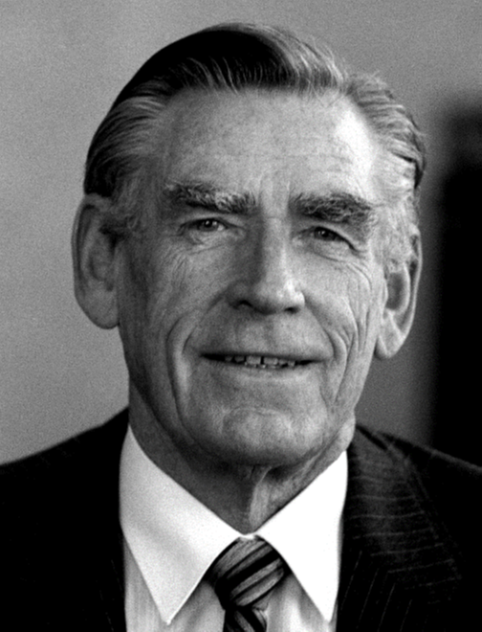In the presence of the German Minister for Digital Affairs and Transport, CHEP representatives receive the prestigious, posthumous award as their predecessor joins the ranks of Jeff Bezos, Henry Ford and Gottlieb Daimler
Both the vision and driving force behind CHEP’s closed rental pool that allows companies to share and reuse around 375 million pallets, crates and containers in approximately 60 countries – Australian Oliver Richter (1920 – 2014) is recognised today for pioneering the circular and intrinsically sustainable use of pallets in the logistics industry.
As a trade manager at CHEP’s parent company, Brambles, Oliver Richter discovered the potential of a closed rental pool for load carriers in the 1960s and successfully set up what is considered as one of the most sustainable and efficient logistics models globally. Kai Derda, Country General Manager of CHEP Germany, and Volker Sdunzig, Senior Vice-President of CHEP Central and Eastern Europe received the award on behalf of both Mr Richter and CHEP at a gala reception at Berlin’s iconic KaDeWe department store.
A non-profit initiative founded in 2003 and presided today by German Minister for Digital Affairs and Transport, Dr. Volker Wissing, the Logistics Hall of Fame recognises leading figures who have made outstanding efforts to promote the further development of logistics and supply chain management and offers a platform to showcase both logistics performance capability and its importance for societal development. Voted in by a global, 60-strong jury comprising journalists, scientists, politicians, associations and representatives of the logistics industry, Oliver Richter accompanies George Raymond Sr., founder of the Raymond Corporation, and the associations UIC and EPAL to enter the Logistics Hall of fame as ‘pallet pioneers’ this year. They join 41 logisticians, including Jeff Bezos, Henry Ford and Gottlieb Daimler.
“Being part of the Logistics Hall of Fame is a great honour for CHEP, and certainly would have been for Mr Richter. Thanks to his vision, CHEP was able to roll out its inherently sustainable supply chain logistics model”, said Volker Sdunzig, Senior Vice-President of CHEP Central and Eastern Europe. “Year after year, pallet manufacturers continue to strive to make pallets an even more intelligent and reliable means of transporting and presenting goods. The Internet of Things (IoT) and Big Data are the next revolution in our path to not only a net-zero, but to a fully regenerative supply chain.”
Born in Sydney on 23rd October 1920, Richter left school at a young age and at the height of the Great Depression, pursuing instead accountancy studies at night school. On joining Brambles in 1965, he was soon driven by a vision to wider replicate the Australian pallet ‘pooling’ system of the Commonwealth Handling Pool (CHEP), originally pioneered by US military based in Australia during World War II. A joint venture took that pallet pooling and leasing model first to the UK in the mid-70s, with the pursuing years of Richter’s career seeing CHEP further expand into continental Europe, South Africa and North America. On retiring from Brambles in 1992, Oliver Richter had successfully served as CEO, Chairman and Deputy Chairman and had overseen CHEP becoming the largest pallet rental company in the US, an ambition that had seemed unattainable in the 1960s.
Whereas the question as to who invented the ‘pallet’ cannot be answered unequivocally, Richter was undoubtedly the driving force behind the pallet becoming an optimised, reliable and sustainable logistics solution to a growing number of transported goods.
Instrumental in standardising pallet – but also container and crate – sizes, Richter was at the heart of developing a system of pallet control that became an industry standard and led to more efficient movement of goods. For the first time, the CHEP ‘share and reuse’ model allowed for pallets, crates and containers to be made available for shared use, eliminating the need for customers to invest in – or manage their own – stock and significantly reducing waste. Sixty years later, Richter’s vision of a purely circular packaging and logistics model is at the heart of CHEP’s collective ambition to achieve net-zero targets in the transportation industry, making him not only a pallet pioneer but also a sustainability visionary.
About CHEP
CHEP helps move more goods to more people, in more places than any other organisation on earth. Its pallets, crates and containers form the invisible backbone of the global supply chain and the world’s biggest brands trust CHEP to help them transport their goods more efficiently, sustainably and safely. As pioneers of the sharing economy, CHEP created one of the world’s most sustainable logistics businesses through the share and reuse of its platforms under a model known as ‘pooling’. CHEP’s ambition is to create a positive impact on the planet and society, pioneering regenerative supply chains. CHEP primarily serves the fast-moving consumer goods (e.g. dry food, grocery, and health and personal care), fresh produce, beverage, retail and general manufacturing industries. CHEP employs approximately 11,500 people and believes in the power of collective intelligence through diversity, inclusion and teamwork. CHEP owns approximately 345 million pallets, crates and containers through a network of more than 750 service centres, supporting more than 500,000 customer touch-points for global brands such as Procter & Gamble, Sysco and Nestlé. CHEP is part of the Brambles Group and operates in approximately 60 countries with its largest operations in North America and Western Europe.
For more information on CHEP, visit www.chep.com. For information on the Brambles Group, visit www.brambles.com.


